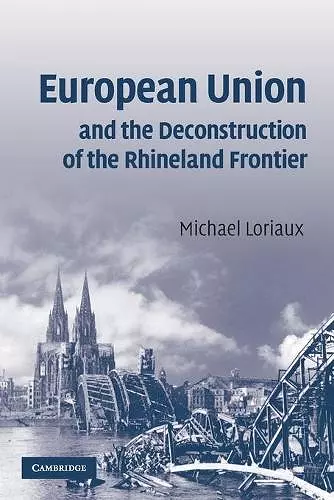European Union and the Deconstruction of the Rhineland Frontier
Format:Paperback
Publisher:Cambridge University Press
Published:11th Sep '08
Currently unavailable, and unfortunately no date known when it will be back

Examines problems posed by the history of the Rhineland region and its effects upon the foundation of the European Union.
In an original study of the history and politics of the Rhineland region, Michael Loriaux argues that the European Union is about frontier deconstruction, but that deconstruction has stopped half-way. While political frontiers have been deconstructed, cultural separators are still in place and compromise the development of the European Union.The Rhineland region includes the core regional economy of western Europe, encompassing Belgium, Luxemburg and parts of the Netherlands, France, Switzerland and Germany. Throughout history there have been tensions between this region's roles as a frontier and as western Europe's economic core. Michael Loriaux argues that the European Union arose from efforts to deconstruct this frontier. He traces Rhineland geopolitics back to its first emergence, restoring frontier deconstruction to the forefront of discussion about the EU. He recounts how place names were manipulated to legitimate political power and shows how this manipulation generated the geopolitics that the EU now tries to undo. Loriaux also argues that the importance of this issue has significantly affected the nature of the EU's development and helps condition a festering legitimation crisis.
'European Union and the Deconstruction of the Rhineland Frontier is nothing short of a reinterpretation of European history since pre-Roman times. It is a work of tremendous thought and scholarship, involving research in at least four languages, that gives us an entirely new way to think about national and European identity. This book is not only brilliant, it is path-breaking, and likely to be a landmark in its field.' Harvey B. Feigenbaum, The George Washington University
'Loriaux not only draws on the works of political geographers, international political economists, international relations specialists and historians, but integrates their insights in an approach that takes culture seriously. Challenging, interesting and illuminating.' Friedrich Kratochwil, European University Institute
'Drawing on Derrida and his notion that texts function as coups de force, Loriaux deconstructs a handful of discursive coups over two thousand years of history – Caesar's The Gallic Wars (1st c. BC), The Donation of Constantine (8th c.), the so-called works of Ossian (1760s), and a French constitutional decree dividing revolutionary France into departments – to show how these coups fractured and melded mental space in the Rhenish heart of Europe, prompted the development of the modern state and nurtured the national idea, reordered land use and commercial practice, impoverished and enriched communities, and finally made the map of Europe seem natural and inevitable. Loriaux tells this story with stunning control over his source material and unfaltering fluency. The book has a compelling narrative drive – as they say so often about pot-boilers, it's a page turner. A radically original interpretation of Franco-German history, seen from the banks of a great river system, this book is not potboiler but a Bildungsroman.' Nicholas G. Onuf, Florida International University
'Michael Loriaux has written a concise, well-judged and most useful analysis of the history, political economy, and 'space' of the Rhineland frontier. It is really rare to find such a wonderful conjunction of history, geography and theory between two covers. His deeply informed and novel conception of this critically placed place and space will be essential reading for anyone wanting to understand the formation and contemporary significance of the European Union.' Bruce Cumings, University of Chicago
'Readers who want to explore the EU's linguistic struggle to legitimate itself with reference to the European past will find this book intelligent and informative.' The Journal of Central European History
ISBN: 9780521707077
Dimensions: 228mm x 153mm x 22mm
Weight: 560g
350 pages